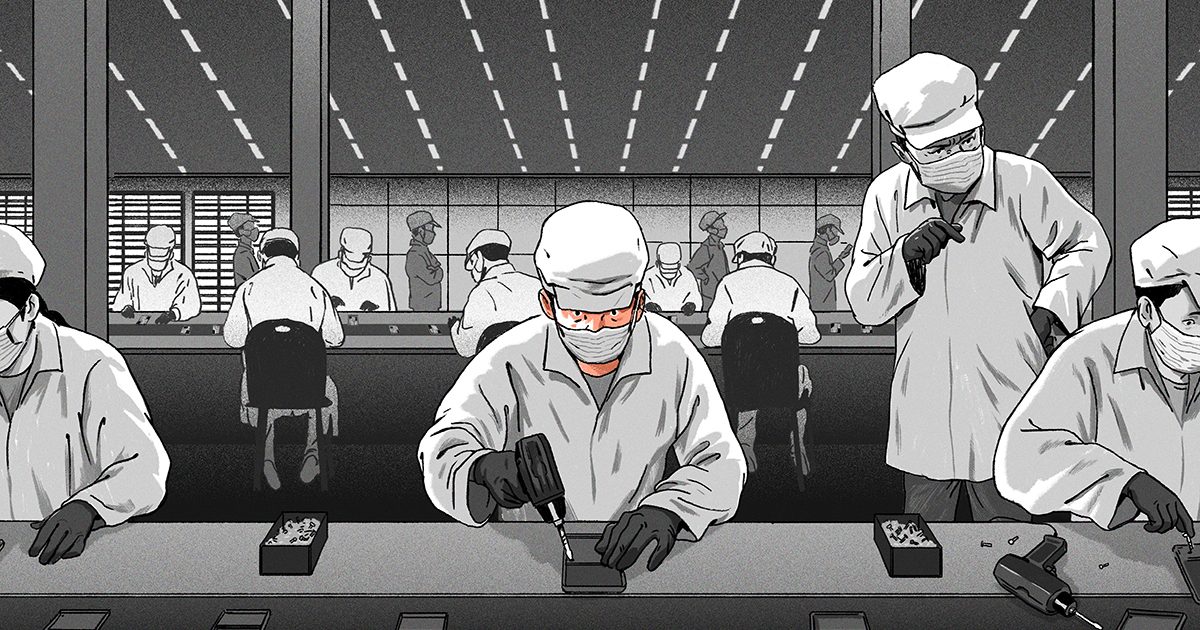Inside China's iPhone City: Labor Conditions Revealed
Core Concepts
The author highlights the challenging and demanding working conditions faced by laborers at Foxconn's iPhone assembly line in Zhengzhou, China. The core argument revolves around the sacrifices of dignity and rights made by workers for financial gain.
Abstract
Laborers at Foxconn's factory in Zhengzhou endure grueling conditions to meet production targets for Apple's iPhones. The intense work pace, strict supervision, and pressure to maintain high productivity take a toll on workers' physical and mental well-being. Despite the generous pay, many employees express feelings of humiliation and disillusionment with the demanding nature of their jobs. The seasonal nature of employment leads to instability, with workers facing uncertainty about job security and future prospects. Labor conflicts, Covid-19 outbreaks, and protests further highlight the challenges faced by workers in this environment.
“iPhones are made in hell”: 3 months inside China’s iPhone city
Stats
During a normal 10-hour shift, Hunter was expected to attach 600 cables to 600 cases using 1,200 screws.
Apple was losing out on $1 billion per week in iPhone sales during a crisis at Foxconn.
Foxconn offered up to 13,000 yuan ($1,917) in bonuses to prevent worker attrition ahead of Lunar New Year holidays.
Quotes
"I feel we have no rights and dignity inside the workshops." - Hunter
"It’s hard to make a living elsewhere, so we came to the factory." - Anonymous Foxconn worker
Key Insights Distilled From
by Viola Zhou at restofworld.org 01-31-2023
https://restofworld.org/2023/foxconn-iphone-factory-china/
Deeper Inquiries
How can companies like Foxconn balance profitability with ensuring humane working conditions for their employees?
Companies like Foxconn can balance profitability with ensuring humane working conditions for their employees by implementing several key strategies. Firstly, they can invest in automation and technology to reduce the reliance on manual labor-intensive tasks, thereby minimizing the physical strain on workers. This not only improves efficiency but also reduces the risk of repetitive stress injuries.
Secondly, providing adequate training and support for workers can enhance their skills and job satisfaction, leading to higher productivity levels. Additionally, offering competitive wages and benefits that exceed industry standards can attract and retain skilled workers while improving morale within the workforce.
Moreover, establishing clear communication channels between management and employees allows for grievances to be addressed promptly and transparently. Creating a safe and inclusive work environment where workers feel valued and respected is essential in promoting employee well-being.
Lastly, conducting regular audits of working conditions, enforcing labor laws compliance, and collaborating with relevant stakeholders such as government agencies or non-profit organizations can help ensure that ethical standards are upheld throughout the supply chain.
How does consumer demand play a role in perpetuating harsh labor conditions in manufacturing facilities?
Consumer demand plays a significant role in perpetuating harsh labor conditions in manufacturing facilities due to the pressure it places on companies to meet production targets quickly at low costs. In response to high demand for products like iPhones, manufacturers often resort to practices such as excessive overtime hours, minimal breaks, substandard wages, and poor working conditions to increase output rapidly.
Consumers' desire for affordable goods drives companies to prioritize cost-cutting measures within their supply chains which may lead them to engage suppliers who exploit cheap labor or compromise worker safety standards. As long as consumers continue purchasing products without considering the ethical implications of how they are made or demanding transparency from brands about their sourcing practices, there will be little incentive for companies to improve working conditions.
Furthermore, intense competition among manufacturers compels them to prioritize profit margins over worker welfare since meeting consumer demands swiftly is crucial for maintaining market share.
How can global supply chains be restructured to prioritize worker welfare while meeting market demands?
Restructuring global supply chains to prioritize worker welfare while meeting market demands requires a multi-faceted approach involving collaboration among various stakeholders. One way this could be achieved is through increased transparency throughout the entire supply chain by implementing traceability systems that track each stage of production from source materials to final product assembly.
Additionally, creating partnerships with local communities where factories are located can help ensure that workers' rights are protected through initiatives such as fair wages agreements or access to education programs aimed at upskilling employees.
Implementing strict compliance measures based on international labor standards enforced by independent auditors would hold suppliers accountable for maintaining safe working environments free from exploitation. Companies should also consider diversifying sourcing locations beyond countries known for lax regulations towards regions where worker protection laws are more stringent.
Ultimately, fostering a culture of corporate social responsibility within organizations by prioritizing ethical business practices over profit maximization is crucial in reshaping global supply chains towards prioritizing worker welfare while still meeting market demands effectively.
0
